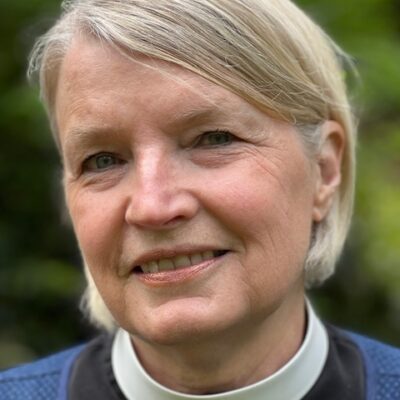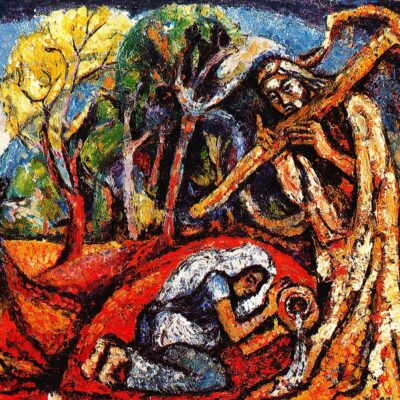There is a pause in the narrative accounts of Jesus and his followers. The three synoptic gospels of Matthew, Mark and Luke race along from one dramatic event to another. There is always something happening – healing, teaching, opposition, journeys, questions, arguments, worship, prayer, eating, drinking, and finally suffering, death, grief, anguish, confusion, fear and then resurrection, forgiveness, affirmation, encouragement, comfort and commissioning. Whew!
If you read any of these three gospels, you will go on a roller coaster ride with the disciples as they meet, follow, lose and then are reunited with Jesus. Mark and Matthew end abruptly with the risen Christ giving marching orders to the disciples to go into the world to share the good news. John, whose gospel takes an entirely unique approach ends with an acknowledgement that there’s a lot more to tell but there aren’t enough books to contain the full story.
But Luke does something different. He brings the narrative all the way through the death and burial of Jesus to his resurrected presence with them in rooms and meals and on the road to Emmaus. And then, in three short sentences he tells how Jesus left them, ascending up into heaven as he blesses them and they worship him. The End.
Only it’s not the end. It’s just the Great Pause. The other gospels end and the story doesn’t get taken up again until the letters from the Apostle Paul many years after the death of Jesus. But Luke writes another book, the Acts of the Apostles. It’s the sequel to his gospel book.
It begins with Jesus ascending into heaven. He repeats the ending of Luke at the beginning of Acts. He begins with the Great Pause, that break in the narrative and all the action. The disciples go back into a room. They huddle together behind closed doors. They put themselves in spiritual quarantine, limiting the people they are in contact with to the 11 closest disciples of Jesus along with Jesus’s mother, his brothers and “certain women” who were probably the most faithful of his followers, who had never deserted him.
They don’t preach or evangelize. They don’t make any journeys to share the good news with those who’ve never heard about Jesus. They don’t even go out to heal the sick, visit the imprisoned or feed the hungry. They remain inside their room, devoting themselves to prayer.
After all they’ve learned, experienced, grown and seen they pause for prayer. They wait and they pray. Jesus has told them to expect the Spirit but he didn’t mention how and when that might happen. In fact, when they asked, he makes it clear that “It is not for you to know the times or periods that the Father has set by his own authority.” In other words, you guys are not in charge. You have an important job to do. You are to wait, pray and trust. When the time is right, you will receive the power of the Holy Spirit. You will be given the strength, inspiration and ability to witness to the love of God, not just here in a familiar place, but in places you never dreamed of going. When the Spirit catches fire in the world it will take you beyond anything you have ever known before and enable you to do things you never imagined would be possible. Nothing will ever be the same.
That event, the one they were waiting and praying for, the one promised by Jesus right before he left their sight for good, is Pentecost. At Pentecost the Spirit blew open the closed doors where they were waiting and praying, shut off from the world, and propelled them into crowds of thousands to preach the good news in every language under heaven. The Great Pause ends with the rush of wind, tongues of flame and the life-changing power of the Holy Spirit. It’s an amazing story that you will find in the second chapter of Acts. What happened there is still resonating the world over, nearly 2,000 years later.
On that day, what we know as the Christian movement, the Church was born. And that same rush of the Spirit returns over and over again in the lives of individuals and in whole communities.
Before we get to Pentecost though, there is a pause, a break in the narrative, an in-between time, a time of waiting and praying and staying indoors. This is the time between Ascension and Pentecost and that’s right where we are today in the church calendar. The Feast of the Ascension was this past Thursday. The Feast of Pentecost will be next Sunday. We’re in the Great Pause in between. We are waiting and praying, learning to trust the Spirit, expecting but not knowing what might happen. We are both anxious and anticipating. We are both hopeful and scared.
And we don’t know when the time will be. We don’t know when we will be released from our current quarantine. We’re not sure what the world will look like on the other side of this pandemic and we’re anxious about how we will get there. As church people, we are used to a 40 day discipline, like the season of Lent or the 40 years the Israelites wandered in the wilderness or the 40 days and 40 nights of rain in Noah’s time. Pentecost designates a 50 day time period. It was 40 days from Easter Sunday to Ascension Day and it will be 50 days from Easter to Pentecost. It’s designated as a full and complete time. We can handle that.
But we’ve been away from church gatherings for 77 days already and we are not prepared for this long of a waiting period. We’re getting anxious and antsy. Some are losing trust in authority and want to be free to make decisions for themselves about what to do and when to do it. Some in authority seem unable to be clear or consistent about the best path forward and sow discord, confusion and consternation by making proclamations that are untrue, misguided or flat out wrong.
My Facebook feed is full of comments, responses, and official letters from clergy in response to the recent directive from the President to open the doors to all church goers this weekend. There are many fine reminders that the church is not the building and that we continue to be the Beloved Community of Jesus whether or not we assemble together for worship. There are lots of clever sayings that affirm the church has always been essential and especially so, through these difficult times. I even changed our big front sign this weekend to read. The Church Abides. The Big Dude Still Rules. Join us Live on Facebook, Sundays at 10AM.
But the fact remains that we probably won’t be returning to normal worship for weeks, months or even longer. As long as there is a virus with no treatment and no universal vaccine, people will still be vulnerable, particularly when they gather inside in crowds where singing and speaking disperse droplets and people are unable to maintain a safe distance. The graduated phases won’t allow us to welcome everyone back into the building, especially those who face health challenges, until it is completely safe. Our gathered community will never be complete and whole and healthy until it can include everyone. It seems likely that we will be practicing virtual worship and Zoom coffee hours and meetings for some time to come.
We will do so, not because it is mandated, but because we love one another and we don’t want anyone to suffer and die needlessly because of our carelessness. We may choose to give up our rights on behalf of others, to live with the unfairness of foregoing what is meaningful to us, knowing that the system has never been fair for people of color, poor people and those on the margins. As followers of the one who abandoned his own rights and privileges on our behalf, we will not insist on our own way when it only benefits us and may put others at risk.
So how, in God’s name, will we have the patience and fortitude to endure this present, painful reality? For the past few weeks, we have heard from the letter attributed to Peter, although certainly not written by the hand of the Apostle since it addresses situations faced by the church a couple of decades after the death of the earliest followers of Jesus. This letter speaks to a small, beleaguered group of Christians who are a tiny and intensely disliked minority. They’re suffering for their faithfulness. They are being reviled by the public and misunderstood. They’re anxious and afraid. And they’re under attack, not just from those who oppose their faith, but from the Devil, the force of evil and despair that attacks from within with lies, discord and hopelessness.
It would be easy for them to lose heart. It would be easy to begin turning against one another, blaming their leaders and one another and acting, every one in their own best interests. They could withdraw and abandon community, blend in with the rest of society, abandon the difficult call of Jesus. Peter reminds them of Jesus’s words in his most famous sermon, the Sermon on the Mount. He tells them that they will be blessed when they are reviled and hated. He repeats the promise that the humble will be exalted. He points to other sisters and brothers in Christ who suffer as much if not even more than they do and yet endure.
These words from our ancestors in the faith encourage us to remember the promises of God and to be faithful in prayer during our own Great and Holy Pause. In the scope of eternity, this period will only be a little while. “The God of all grace who has called you to his eternal glory in Christ will himself, restore, strengthen, and establish you.”
The promise of God is sure and certain. God sends the Spirit and God’s people are renewed and empowered to answer God’s call and to live out Christ’s commission in the world. It is true the church has never closed. The church abides. The church is you and me, gathered in prayer and worship, in our homes, online, in essential workplaces, or wherever we may be. The church is still feeding the hungry even if it’s in a parking lot with chairs spaced 6 feet apart. The Spirit can never be contained in a building or a worship service but instead blows through all of creation with power, creativity and inspiration.
Be patient my friends. Remember the promises of God. Keep praying. Once this Great Pause is over, the Spirit may explode in our lives, propelling us to be witnesses to the love and grace of God even to the ends of the earth! Amen. Alleluia






